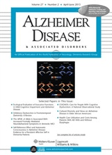
ALZHEIMER DISEASE & ASSOCIATED DISORDERS
Scope & Guideline
Empowering professionals with cutting-edge findings on dementia.
Introduction
Aims and Scopes
- Cognitive Function and Dementia Assessment:
Research that explores various methodologies for assessing cognitive function, including neuropsychological tests and imaging techniques, to better understand dementia progression. - Biomarkers and Pathophysiology:
Studies focusing on identifying biomarkers for Alzheimer's disease and related disorders, as well as understanding the underlying biological mechanisms contributing to neurodegeneration. - Impact of Lifestyle and Environmental Factors:
Investigations into how lifestyle choices, such as physical activity and diet, as well as environmental factors, influence cognitive health and the risk of dementia. - Caregiver Studies and Psychosocial Aspects:
Research examining the burden and quality of life for caregivers of Alzheimer’s patients, and the psychosocial impacts of dementia on individuals and families. - Clinical Interventions and Therapeutics:
Studies investigating various therapeutic approaches, including pharmacological and non-pharmacological interventions, aimed at managing or treating Alzheimer’s disease and related disorders. - Diversity and Health Disparities:
Research that highlights the differences in Alzheimer’s disease prevalence and outcomes among diverse populations, addressing health disparities in care and access.
Trending and Emerging
- Holistic and Multidisciplinary Approaches:
There is an increasing trend towards studies that incorporate multidisciplinary perspectives, including psychological, social, and environmental factors in understanding and managing Alzheimer’s disease. - Prevention and Early Intervention Strategies:
Research focused on identifying early signs of cognitive decline and implementing preventive strategies is gaining prominence, highlighting the importance of early detection and intervention. - Technology in Dementia Care:
The use of technology, including digital health tools and telemedicine, in dementia care and research is on the rise, reflecting a shift towards innovative solutions for patient management and research methodologies. - Cultural and Ethnic Studies in Dementia:
Emerging research is increasingly examining the cultural and ethnic dimensions of dementia care, addressing how cultural factors influence perceptions, diagnosis, and treatment of Alzheimer’s disease. - Neuropsychiatric Symptoms and Behavioral Interventions:
There is heightened interest in exploring neuropsychiatric symptoms associated with dementia and the development of behavioral interventions to manage these symptoms effectively.
Declining or Waning
- Genetic Studies in Alzheimer’s Disease:
Although genetic research remains important, the frequency of publications focusing solely on genetic variants related to Alzheimer’s has decreased, possibly due to a saturation of findings and a shift towards integrative approaches that consider environmental and lifestyle factors. - Animal Models in Alzheimer Research:
There has been a noticeable decline in studies exclusively using animal models to investigate Alzheimer’s disease, indicating a potential shift towards human-centric research and clinical studies. - Traditional Pharmacological Approaches:
The focus on traditional pharmacological treatments for Alzheimer’s disease is waning as researchers increasingly explore alternative and complementary therapies, including lifestyle interventions and holistic approaches.
Similar Journals
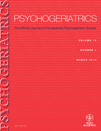
Psychogeriatrics
Empowering professionals with cutting-edge psychogeriatric research.Psychogeriatrics is a leading peer-reviewed journal published by WILEY, dedicated to advancing the understanding of mental health and geriatric psychiatry. With an ISSN of 1346-3500 and an E-ISSN of 1479-8301, this journal has been integral to the field since its inception in 2005 and continues to publish cutting-edge research until 2024. Recognized for its impact, Psychogeriatrics holds a commendable Q2 quartile ranking in Geriatrics and Gerontology, Gerontology, and Psychiatry and Mental Health as of 2023. The journal's Scopus rankings reflect its significant contribution to Nursing Gerontology, Medicine Psychiatry and Mental Health, and Medicine Geriatrics and Gerontology. Although it operates with no open access options, Psychogeriatrics remains a vital resource for researchers, professionals, and students who are exploring the complexities of mental health in older populations. The journal not only disseminates innovative research but also tackles pressing issues related to the psychological well-being of the elderly, making it essential reading for anyone focused on improving geriatric mental health care.
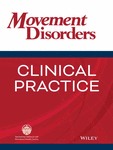
Movement Disorders Clinical Practice
Transforming understanding into effective treatments.Movement Disorders Clinical Practice, published by WILEY, is an essential peer-reviewed journal dedicated to advancing the understanding and treatment of movement disorders from a clinical perspective. With an ISSN of 2330-1619, this journal serves as a vital resource for researchers, clinicians, and students engaged in neurology and clinical neuroscience. Since its inception in 2014, the journal has established itself within the medical community, currently positioned in the Q2 category for both Neurology and Neurology (Clinical), reflecting its influence and reputation. Although it does not offer open access, the journal is integral for disseminating high-quality research and clinical insights, thereby contributing significantly to improved patient care and outcomes in the field of movement disorders. Based in Hoboken, NJ, it continues to attract contributions from leading experts and aims to foster a deeper understanding and dialogue surrounding contemporary challenges and advancements in movement disorder treatment.
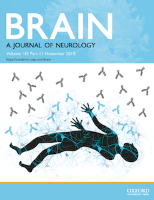
BRAIN
Pioneering Research at the Intersection of Neurology and MedicineBRAIN, published by Oxford University Press, stands as a preeminent journal in the realms of neurology and medicine, with a formidable impact factor reflecting its rigorous peer-reviewed standards and significant contributions to the field. With its ISSN 0006-8950 and E-ISSN 1460-2156, this esteemed publication spans over a century of exceptional research, converging from its historical roots in 1878 to current groundbreaking studies. BRAIN boasts a distinguished rank of #8 out of 400 in the Scopus category of Neurology (Clinical), placing it in the 98th percentile of institutions, indicative of its influence and reach. Operating under the Q1 category in both Medicine (Miscellaneous) and Clinical Neurology, the journal is dedicated to fostering interdisciplinary dialogue among researchers, clinicians, and students alike. With a focus on innovative findings and clinical advancements, BRAIN serves as a vital resource for those seeking to deepen their understanding of neurological disorders and the evolving landscape of medical research.

AGING CLINICAL AND EXPERIMENTAL RESEARCH
Illuminating the science of aging and its impacts.Aging Clinical and Experimental Research, published by Springer, is a premier journal dedicated to advancing the field of geriatric medicine and understanding the complexities of aging. With a commitment to publishing high-quality original research, review articles, and clinical studies, this journal plays a crucial role in disseminating knowledge to researchers, healthcare professionals, and students interested in the biological, clinical, and social aspects of aging. Boasting a 2023 impact factor that places it in the Q2 quartile for both Aging and Geriatrics and Gerontology categories, it ranks favorably within the Scopus metrics—20th out of 116 in Geriatrics and Gerontology and 15th out of 38 in Aging. The journal provides vital insights for the ongoing discourse in aging research, making it an essential resource for those seeking to enhance their understanding of aging-related phenomena and improve healthcare outcomes across populations. The converged years of publication from 1989 to 2024 demonstrate its longstanding commitment to the field, highlighted by its notable presence in Germany and access to a broad international readership.

Frontiers in Aging Neuroscience
Pioneering Discoveries in Aging Neuroscience.Frontiers in Aging Neuroscience, published by FRONTIERS MEDIA SA, is a leading open-access journal dedicated to the field of aging neuroscience, with its ISSN being 1663-4365. Since its inception in 2009, this journal has provided a platform for researchers to disseminate their findings on the neurological aspects of aging, addressing critical issues that impact cognition and overall brain health in the elderly population. With a commendable 2023 impact factor, the journal ranks in the Q2 category in both Aging and Cognitive Neuroscience, positioning it among the top-tier publications in these fields. Notably, it is recognized within Scopus, ranking #32 out of 115 in Neuroscience (Cognitive Neuroscience) and #20 out of 38 in the Aging sector, with corresponding percentiles of 72nd and 48th, respectively. As an open-access journal, it promotes unrestricted access to research findings, fostering collaboration and innovation among the academic community. Researchers, professionals, and students alike can explore cutting-edge studies that contribute to understanding the complexities of neurological aging and work towards improving cognitive health in an aging society.

JOURNAL OF ALZHEIMERS DISEASE
Fostering breakthroughs in neurodegenerative research.Journal of Alzheimer's Disease, published by IOS Press, stands as a pivotal resource in the fight against Alzheimer's and related neurodegenerative disorders. With an ISSN of 1387-2877 and an E-ISSN of 1875-8908, this esteemed journal has evolved since its inception in 1998, providing a vital platform for academic research and clinical practice in the realms of Clinical Psychology, Geriatrics and Gerontology, Neuroscience, and Psychiatry and Mental Health. Ranked in the Q1 category across several disciplines, including Clinical Psychology and Geriatrics, this journal not only highlights significant advancements in understanding Alzheimer's disease but also fosters interdisciplinary dialogue among researchers, healthcare professionals, and policymakers. Boasting robust Scopus rankings—such as 49th in Clinical Psychology and 29th in Geriatrics—this journal is committed to disseminating high-quality research that informs both therapeutic strategies and public health initiatives. The Journal of Alzheimer's Disease is an essential resource for anyone dedicated to exploring the complexities of cognitive decline and enhancing care for affected individuals.

AMERICAN JOURNAL OF GERIATRIC PSYCHIATRY
Exploring the Depths of Aging Minds: Your Gateway to Geriatric PsychiatryAmerican Journal of Geriatric Psychiatry, published by Elsevier Science Inc, stands as a leading journal in the fields of geriatrics and gerontology, as well as psychiatry and mental health, recognized with a Q1 ranking in both categories for 2023. With a robust ISSN of 1064-7481 and E-ISSN 1545-7214, this journal has been a vital resource since its inception in 1993, contributing to the academic discourse surrounding the mental health of older adults. The journal focuses on publishing high-quality research and reviews that address the complexities of psychiatric disorders in geriatric populations, making it essential reading for researchers, professionals, and students dedicated to enhancing the mental well-being of elderly individuals. Notably, it achieves impressive Scopus rankings, sitting at the 5th percentile in Geriatrics and Gerontology and 24th percentile in Psychiatry and Mental Health, underscoring its impact and relevance in the academic community. While it does not offer open access, the journal's comprehensive content is vital for those looking to stay informed on the latest advancements in geriatric psychiatry. For more information, readers can access it via Elsevier's educational platforms.
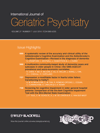
INTERNATIONAL JOURNAL OF GERIATRIC PSYCHIATRY
Enhancing understanding of psychiatric disorders in older adults.International Journal of Geriatric Psychiatry, published by Wiley, stands as a premier journal dedicated to advancing the field of mental health in older adults. With an impressive impact factor reflective of its Q1 categorization in both Geriatrics and Gerontology, as well as Psychiatry and Mental Health, this journal addresses the critical intersection of aging and mental health, providing a platform for impactful research from 1986 through 2024. Researchers and professionals will find the journal invaluable, as it offers comprehensive insights into a range of subjects pertinent to geriatric mental health, with its ranking in Scopus highlighting its academic rigor and relevance (Rank #147/567 in Psychiatry and Mental Health; Rank #37/116 in Geriatrics and Gerontology). Though it operates on a traditional subscription model, the journal's significant contributions to the understanding of psychiatric disorders in the elderly make it a key resource for anyone involved in geriatric care and research.

Journal of Alzheimers Disease Reports
Connecting Researchers for a Brighter FutureJournal of Alzheimer's Disease Reports, published by IOS PRESS, is an essential open-access platform dedicated to advancing research in the fields of clinical psychology, geriatrics, gerontology, neuroscience, and psychiatry. Since its inception in 2017, this journal has rapidly gained recognition, achieving a commendable status reflected in its 2023 category quartiles, notably ranking Q2 in Clinical Psychology and Psychiatry and Mental Health. With a sustained commitment to disseminating high-quality research and facilitating collaboration among scientists, the journal offers insights into the critical aspects of Alzheimer's disease and related cognitive disorders. Given its positions in the Scopus ranks, it serves as a crucial resource for academics and practitioners alike, empowering them to contribute effectively to the ongoing discourse in cognitive health. The journal embraces open access, ensuring that all research findings are freely available to the global community, thereby enhancing visibility and engagement. With a focus on fostering innovation and knowledge transfer, Journal of Alzheimer's Disease Reports is poised to make an enduring impact in the field of dementia research.

npj Aging
Fostering interdisciplinary dialogue on aging.npj Aging, published by Nature Publishing Group, is a pioneering journal dedicated to advancing our understanding of the biological, clinical, and social aspects of aging. With an E-ISSN of 2731-6068, this open-access journal aims to foster innovative research and interdisciplinary dialogue among scientists, clinicians, and policy-makers. As of its inception in 2023, the journal has quickly established itself within the scholarly community, ranking 15th in Medicine (Geriatrics and Gerontology) and 12th in Biochemistry, Genetics, and Molecular Biology focusing on Aging, reflecting a strong percentile standing in both categories. The journal provides a platform for disseminating important findings that address the complexities of aging, ensuring accessibility for a broader audience. Located at the Macmillan Building, 4 Crinan St, London, England, npj Aging aspires to be an essential resource for those seeking to enhance their understanding and contribute to the field of gerontology.